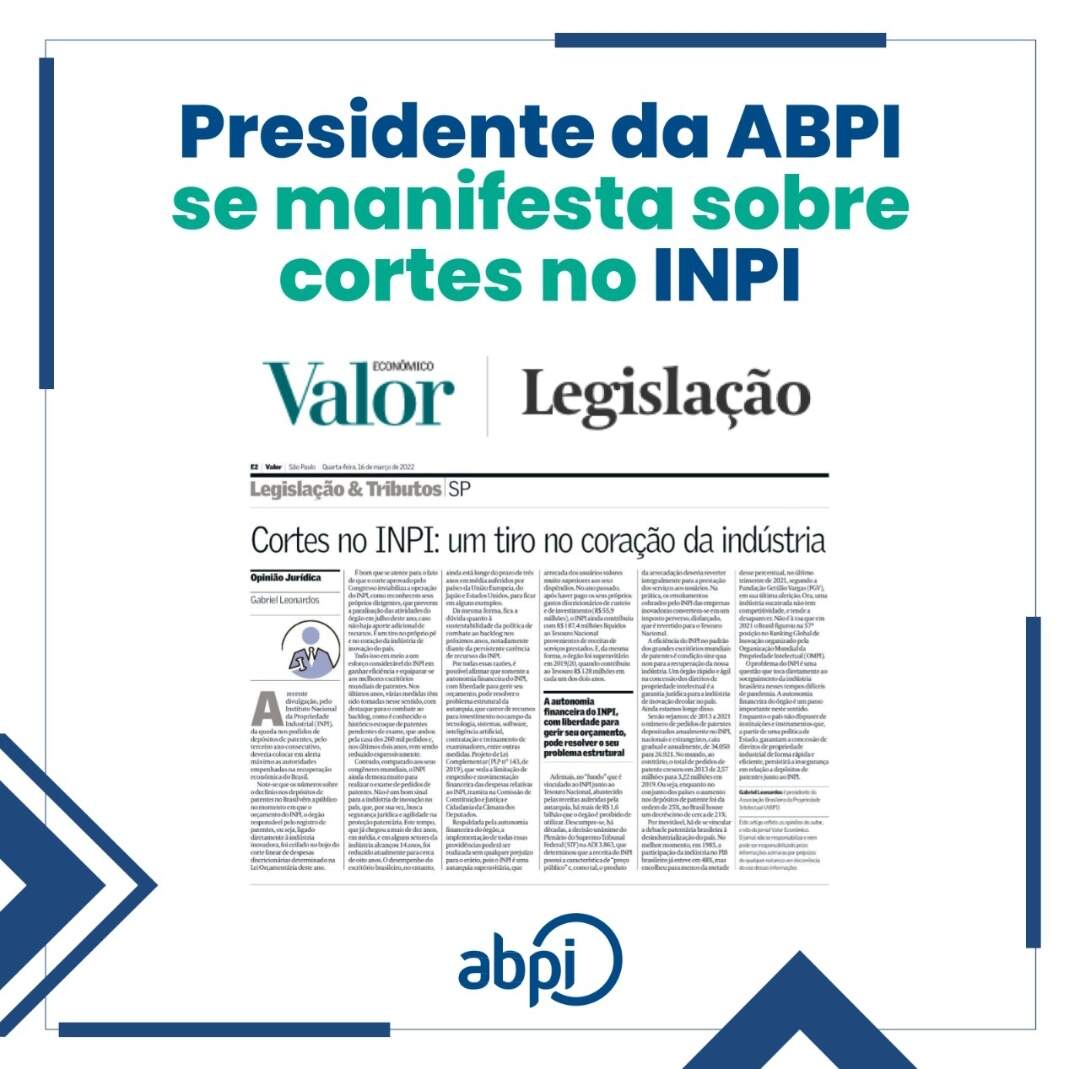An article by Gabriel Leonardos, president of ABPI, was published in today’s edition (03/16) of the Valor Econômico newspaper.
In the article, Leonardos warns of the drop in patent applications for the third consecutive year and the relationship between this drop and the cuts in the INPI’s budget in this year’s Budget Law.
“The INPI’s financial autonomy, with the freedom to manage its budget, can solve its structural problem”, says the president.
Read the full article below:
INPI cuts: a shot in the heart of the industry
By: Gabriel Leonardos
The recent disclosure, by the National Institute of Industrial Property (INPI), of the drop in patent applications for the third consecutive year, should put on high alert the authorities committed to Brazil’s economic recovery.
It should be noted that the figures on the decline in patent filings in Brazil are made public at a time when the budget of the INPI, the body responsible for registering patents, that is, directly linked to the innovative industry, was slashed in the midst of the cut. line of discretionary expenses determined in this year’s Budget Law.
INPI’s financial autonomy, with the freedom to manage its budget, can solve its structural problem
It is good to pay attention to the fact that the cut approved by Congress makes the operation of the INPI unfeasible, as recognized by its own leaders, who foresee the suspension of the activities of the body in July this year, if there is no additional contribution of resources. It shoots itself in the foot and at the heart of the country’s innovation industry.
All this in the midst of a considerable effort by the INPI to gain efficiency and be on par with the best patent offices in the world. In recent years, 8 hours ago, several measures have been taken in this direction, with emphasis on the fight against the backlog, as the historical stock of patents pending examination is known, which reached around 260 thousand applications and, in the last two years, has been significantly reduced.
In the same way, doubts remain as to the sustainability of the policy to combat the backlog in the coming years, notably in view of the persistent lack of resources from the INPI.
For all these reasons, it is possible to affirm that only the financial autonomy of the INPI, with the freedom to manage its budget, can solve the structural problem of the autarchy, which lacks resources for investment in the field of technology, systems, software, artificial intelligence, contracting and training of examiners, among other measures. Complementary Law Project (PLP nº 143, of 2019), which prohibits the limitation of commitment and financial movement of expenses related to the INPI, is being processed by the Constitution and Justice and Citizenship Committee of the Chamber of Deputies.
Supported by the financial autonomy of the agency, the implementation of all these measures can be carried out without any damage to the treasury, since the INPI is a surplus agency, which collects from users amounts much higher than its expenditures. Last year, after having paid its own discretionary funding and investment expenses (R$ 55.9 million), the INPI still contributed R$ 187.4 million net to the National Treasury from revenue from services rendered. And, similarly, the agency had a surplus in 2019/20, when it contributed R$128 million to the Treasury in each of the two years.
The INPI’s efficiency in the standard of the great world patent offices is a sine qua non condition for the recovery of our industry. A quick and agile body in granting intellectual property rights is the legal guarantee for the innovation industry to take off in the country. We are still far from that.
Let’s see: from 2013 to 2021 the number of patent applications filed annually with the INPI, national and foreign, fell gradually and annually, from 34,050 to 26,921. In the world, on the contrary, the total number of patent applications grew on 03/16/2022 from 2.57 million to 3.22 million in 2019. That is, while in the countries as a whole the increase in patent deposits was on the order of 25%, in Brazil there was a decrease of about 21%.
Inevitably, the Brazilian patent debacle must be linked to the country’s deindustrialization. At the best moment, in 1985, the participation of industry in the Brazilian GDP was already at 48%, but it shrunk to less than half of that percentage, in the last quarter of 2021, according to the Getúlio Vargas Foundation (FGV), in its last measurement. However, a scrapped industry has no competitiveness, and tends to disappear. It is no wonder that in 2021 Brazil ranked 57th in the Global Innovation Ranking organized by the World Intellectual Property Organization (WIPO).
The INPI problem is an issue that directly touches the uplift of the Brazilian industry in these difficult times of the pandemic. The financial autonomy of the agency is an important step in this direction. As long as the country does not have institutions and instruments that, based on a State policy, guarantee the granting of industrial property rights quickly and efficiently, insecurity will persist in relation to patent deposits with the INPI.
Gabriel Leonardos is president of the Brazilian Intellectual Property Association (ABPI)


